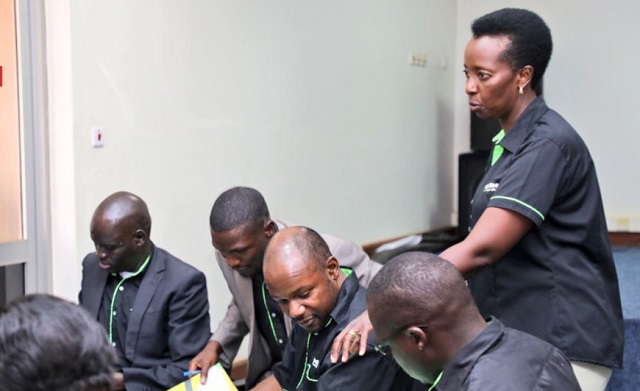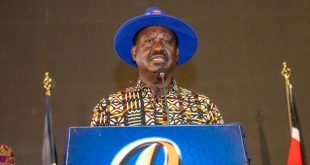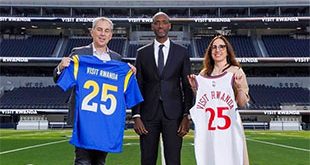
Four years later, her corruption-proof strategy takes shape amidst huge expectations and challenges
Kampala, Uganda | IAN KATUSIIME | In 2015 when President Yoweri Museveni appointed Allen Kagina to head the Uganda National Roads Authority (UNRA), the body had sunk deep into jaw dropping corruption. Exposure and investigations into the infamous Mukono-Katosi saga in which UNRA lost about Shs25 billion in a scheme abetted by some of its managers had led to a mass sacking.
Still, Kagina needed to know the manner, extent, and means by which previous managers enriched themselves fraudulently on taxpayers’ money. When an inquiry appointed by Museveni and chaired by Justice Catherine Bamugemereire uncovered the dirt at UNRA, many wondered how Kagina would fight what came to be dubbed the “UNRA mafia”.
Kagina was a proven corporate reformer, after her years as head of the Uganda Revenue Authority (URA) saw it transformed from a low performing den of corruption to an efficient, result-oriented and relatively clean organisation. But corruption and inefficiency at UNRA appeared to more deeply entrenched and syndicated. How would Kagina fix it?
Kagina started work on May 01, 2015 and this month is a good point to assess the impact she has had over four years at UNRA.
It appears Kagina has focused on building people skills, systems, and a new culture at UNRA. Her approach has been almost similar to the programme she used as Commissioner General at URA.
Kagina’s first public move came five months after she started work when she asked all 900 workers in UNRA to reapply for their jobs. The screening exercise was part of a grander restructuring that was planned to raise the staff levels to 1700. There was a public uproar and threats of law suits. But Kagina’s core team appeared prepared for that and quietly quashed any dissent.
With that out of the way, Kagina moved to setting up the core elements of her restructuring plan. At its centre was a fundamental question: How do you ensure that staff at UNRA which has the biggest budget of any organisation in Uganda does not see that as an opportunity for corruption and self-enrichment? Since the government decided to go big on infrastructure, the roads sector has taken a lion’s share of the national budget. This put whoever was at the helm at UNRA in charge of big monies; an average annual budget of Shs3 trillion.
Kagina’s answer was that the UNRA leaders need to have economic and financial skills, including how to plan for and invest personal resources while at work and even into retirement. It was vintage Kagina. She sees everything in life and leadership as a transition. Nothing is permanent.
At her handover ceremony at URA in 2014, Kagina underscored the importance of planning for change.
“I told a few colleagues earlier that we have not built URA and all the systems only to be handed over to outsiders,” she said. And so Doris Akol, a long time insider at the tax collection body, smoothly succeeded her. Now it appears, she is building something similar at UNRA.
So, she has been conducting leadership sessions for her senior management team.
Dubbed ‘Exceed Leadership’, the trainings take the top brass of the roads agency through leadership and management tenets at corporate and personal levels.
The sessions take place on Mondays and kick off at 7am lasting for about an hour. “It’s a mission of hers to train leaders,” says Mark Ssali, the Head of Public and Corporate Affairs at UNRA. The management team of Uganda Road Fund, a sister body, also attend these sessions.
“Under self-leadership, she believes you have to first manage yourself before you can manage others,” Ssali adds.
The sessions involve studying selected topics, watching documentaries and biographies of renowned people. The range of issues includes how to get the best out of people, working for a common cause, and taking an organisation forward.
When the staff visits successful business ventures and farms, the point is to expose them to opportunities of self-growth that do not involve corruption. Occasionally, Kagina invites successful individuals to give pep talks to her staff.
She has put together a curriculum where self, team, and strategic leadership are taught. Kagina’s leadership philosophy is one that believes in managing transitions at corporate and personal levels.
“She says it would be wrong for a leader to exit an organisation after serving and there is nobody in top management to take over,” says Ahmed Ayub, a UNRA media relations officer.
The political questions
Meanwhile, UNRA has been designing and planning expressways, flyovers in the city on top of expanding and maintaining the national road network. These projects mean she has had to wither a number of tides. Basic project management decisions often easily become a very political exercise at the largest parastatal in Uganda.
Kagina was shaken by a proposed government merger of ministries and agencies that seemed to have UNRA in target. But she was not stirred and the move to clip her wings appears to have died down quietly.
Now UNRA and Kagina appear set to control and manage an even bigger budget; the so-called oil roads money. This responsibility will test Kagina’s culture change effort so far.
The oil roads total to about 600km. They will be mainly in the Albertine region in the districts of Hoima, Buliisa and Masindi where close to 70% of Uganda’s 6.5 billion of barrels of oil are located. They are necessary to move heavy equipment in readiness for the oil sector entering the next production phase in the next few years.
The increased budget will also cater for tourism roads that are spread all over the country snaking through national parks and game reserves.
The budget for the Works sector under which UNRA falls has been going up. In 2006, it was a mere Shs398 billion and then a deliberate government decision saw it go up to a trillion shillings and now it currently stands at Shs4 trillion for the Financial Year 2018/2019.
In the National Budget Framework Paper FY2019/2020, the proposed budget for the Works and Transport sector is Shs5trillion with UNRA’s at Shs3.25 trillion. In FY2018/2019, UNRA was allocated Shs3.13 trillion. The new added money is only about Shs120 billion. With its annual budget, the increment is a drop in the ocean. But it is influencing perceptions and its success or failure could be used to critique Museveni’s fixation with road infrastructure and what he considers its effect on economic growth. Every penny must, therefore, be accounted for.
Robert Kafeero Ssekitoleko, the MP for Nakifuma County who is the Chairperson of the Parliamentary Committee on Physical Infrastructure, says Kagina has so far performed well; especially on reducing operational costs at UNRA.
“Kagina is a very strict person when it comes to authorisation of funding. She pays zero tolerance to corruption,” Ssekitoleko told The Independent.
Ssekitoleko argues that not being a technical person could have created some challenges for Kagina as some projects could have been done in a shorter time. He says also that government processes have also been a setback for UNRA.
“As parliament we appropriate funds and expect Ministry of Finance to secure the loans but they end up not getting the money,” he says.
He says one of Kagina’s biggest changes at UNRA has been to reverse the tide of work that could be done internally being contracted to outside companies.
“Now that has changed. Even the design of roads is being done internally at UNRA which was all being contracted to people,” Ssekitoleko says, “We encourage her to do more of that.”
 The Independent Uganda: You get the Truth we Pay the Price
The Independent Uganda: You get the Truth we Pay the Price





We have just begun Uganda will be transformed by hardworking people by the grace of God.